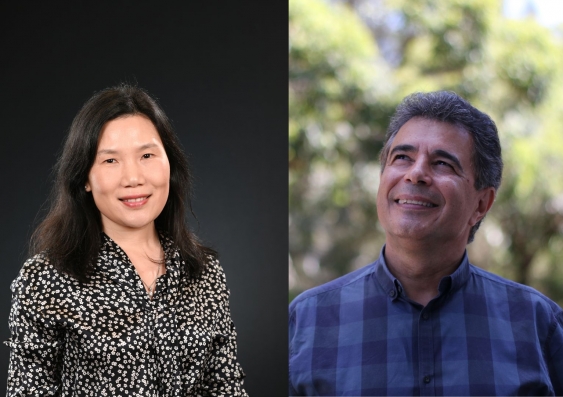Two UNSW academics recognised as Fellows by the Australian Academy of Technological Sciences and Engineering
UNSW academics are named Fellows for their innovative work in solar technology and geotechnical engineering.
UNSW academics are named Fellows for their innovative work in solar technology and geotechnical engineering.

Professor Nasser Khalili, an international leader in geotechnical engineering and Professor Xiaojing Hao, a global expert in solar cell technologies are among 27 academics elected today as Fellows of the Australian Academy of Technological Sciences and Engineering (ATSE).
ATSE President Hugh Bradlow said the new Fellows are shaping Australia’s technology-powered human-driven future.
“Elected by their peers, ATSE Fellows are leaders in applied science, technology and engineering and we celebrate their exceptional professional contributions to Australian STEM innovation,” Professor Bradlow said.
“While the 2022 new Fellows span multiple critical industries, we are pleased to welcome so many at the forefront of tackling climate change. They are creating better batteries to support renewable energy supplies, increasing efficiency and flexibility of solar cells and panels, and developing sustainable mining practices.
“As we face the repeated effects of increased flooding events, they are shaping the way humanity monitors water quality, models marine environments for food and agriculture, advances water catchment policy, and develops best practices for dam and bridge construction.”
Scientia Professor Nasser Khalili FTSE, Head of School of Civil and Environmental Engineering, UNSW.
Professor Nasser Khalili is an international leader in geotechnical engineering, computational geomechanics and unsaturated soil mechanics. His work encompasses roads, tunnels, mines, dams, earthquake engineering and groundwater projects.
He has contributed to projects of national and international interest including the stability assessment of the Olympic Stadium site at Homebush Bay and the seismic hazard investigation for Sydney Airport’s third runway.
Prof. Khalili currently oversees a project diverting 10,000 tonnes of paper and plastic waste into road construction, creating technical leadership in Australian recycling and reducing infrastructure costs. His assessment of Hume Dam helped determine the cause of increasing movement in the dam’s core-wall and the design of an effective solution.
He says his top priorities as a Fellow will be to promote the quality of science, technology and engineering education at all levels, particularly among high school students and the broader community. Also, to engage industry, government and research leaders and infrastructure stakeholders to facilitate implementation of integrated science-based practical solutions to face the challenges facing Australia’s infrastructure.
Professor Xiaojing Hao, FTSE, FAIP, School of Photovoltaic and Renewable Energy Engineering, UNSW.
Professor Xiaojing Hao is a world expert in solar technology and has helped establish Australia’s global leadership in this field. She has set five world records for solar cell efficiency using thin film kesterite materials.
More clean electricity can be generated by incorporating thin film cells into coatings for the sides of buildings or moulding them onto vehicles. Also, layering thin film cells onto silicon cells can generate 20 per cent more electricity from the same area. Prof. Hao led the development of numerous kinds of such thin film cell alternatives maximising the chances of success for next-gen solar cell technologies.
Prof. Hao has previously won the Prime Minister’s Prize for Science: Malcolm McIntosh Prize for Physical Scientist of the Year and the Australian Academy of Science’s Pawsey Medal. She says since entering the solar photovoltaic field 16 years ago, she’s been greatly inspired by how ATSE Fellows Scientia Profssor Martin Green, Dr Zhengrong Shi and Prof Thorsten Trupke have brought their silicon PV technologies from the lab to the factory floor.
“I'm incredibly honoured to be elected as Fellow of ATSE. Taking on the global challenge of climate change, I hope to bring PV technology forward to make it more efficient, lower-cost, more flexible and more widely deployable.”
Read more about the 2022 ATSE Fellows.